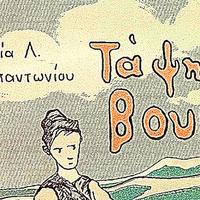75. Ο γάμος της Αφρόδως
Έρχεται το συμπεθερικό. Έρχεται στ' άλογα με τα κόκκινα και με τα πράσινα κιλίμια...
Μπροστά είναι ο παπάς με τ' άσπρα γένια. Είναι και το φλάμπουρο με μήλο κόκκινο στην κορυφή.
Ακολουθεί ο νουνός, ο γαμπρός κι οι συμπεθέροι· οι άντρες με την κάτασπρη φουστανέλα, οι γυναίκες με τα φλουριά στο στήθος. Όλα τα παιδιά είναι καλεσμένα στον γάμο. Ξεκίνησαν μαζί με τον κυρ Στέφανο και πάνε στις βλάχικες καλύβες.
---
Μέσα σε μια καλύβα, οι γυναίκες και τα κορίτσια στολίζουν τη νύφη. Όλη την ώρα που τη στόλιζαν, τα βιολιά έπαιζαν λυπητερό σκοπό.
Άμα τελείωσε το στόλισμα, ζήτησαν ένα παιδί να φορέσει της νύφης τ' άσπρο παπούτσι, που της το έφερε ο γαμπρός. Πρέπει να έχει και μάνα και πατέρα το παιδί που θα κάμει αυτό.
Πήραν τον Φουντούλη. Αυτός έχει και μάνα και πατέρα και γιαγιά και παππού· κι έχουν όλοι γερά δόντια. Έσκυψε και φόρεσε στη νύφη τα παπούτσια της κι η νύφη τον εφίλησε στα κόκκινα μάγουλά του.
---
Το απόγευμα έγιναν τα στεφανώματα. Ο παπάς διάβασε πολλές ευχές από ένα βιβλίο που ήταν γεμάτο κεριά. Έψελνε ο παπάς κι ο ψάλτης και βοηθούσε κι ο Γεροθανάσης λίγο.
Τα έχει ακούσει πολλές φορές ο Γεροθανάσης. Τόσες κόρες κι εγγονές πάντρεψε, που κοντεύει να τα μάθει απέξω.
Απάνω στο στεφάνωμα, ο νουνός έριξε στις πλάτες της νύφης και του γαμπρού ένα τριανταφυλλί μεταξωτό ύφασμα.
---
Το βράδυ έστρωσαν το τραπέζι απέξω από τις καλύβες. Η νύφη κάθισε στο ένα μέρος με τις συμπεθέρες μαζί και στο άλλο οι άντρες.
Τα πρώτα ξαδέρφια της νύφης κι ο Λάμπρος μαζί έφερναν το φαγητό και κερνούσαν το κρασί.
Όταν ο παπάς σήκωσε τα χέρια κι έσιαξε το καλημαύχι του, σώπασαν όλοι, γιατί κατάλαβαν πως θα πει το τροπάρι. Και τότε ο γέρος ο παπάς από το Περιστέρι, με τ' άσπρα του γένια, έψαλε ωραία με δυνατή φωνή τον ύμνο της Θεοτόκου.
---
Έπειτα ήρθε η σειρά του Γεροθανάση να τραγουδήσει.
Πάντα στους γάμους του σπιτιού του λέει το πρώτο τραγούδι ύστερα από το τροπάρι.
Ο τσέλιγκας, κρατώντας το άσπρο κεφάλι του ακίνητο, είπε σιγά και σοβαρά τούτο το τραγούδι:
Ένας γέρος γέροντας, κι ουδέ τόσο γέροντας, εκατόν εννιά χρονών, πότιζε τον γρίβα του . Τα βουνά τριγύριζε και τα δέντρα κοίταζε. «Σεις, βουνά, ψηλά βουνά, τώρα με την άνοιξη δε με ξανανιώνετε μένα και τον γρίβα μου, όπως ξανανιώνονται και καινούρια γίνονται τούτα τα χαμόδεντρα, τα χιλιόχρονα κλαριά, να γινόμουν κι εγώ νιος, όπως ήμουν μια φορά;»
Ο παπάς, καθώς άκουε πως ο Γεροθανάσης ήθελε να ξανανιώσει, τον κοίταζε και χαμογελούσε.
---
Ύστερα οι συμπεθέροι της νύφης τραγούδησαν τούτο το τραγούδι:
Πουλάκι κλαίει στον ποταμό κι εγώ έτυχε και διάβαινα.
Εστάθηκα και το ρωτώ:
«Τι έχεις και κλαις, πουλάκι μου;»
— «Εχτές ήμουν στη μάνα μου κι απόψε στο πεθερικό.»
---
Κι οι συμπεθέροι πάλι του γαμπρού τραγούδησαν: Έβγα, κυρά και πεθερά,
για να δεχτείς την πέρδικα, για να δεχτείς την πέρδικα,
που περπατεί λεβέντικα.
Για ιδέστε την, για ιδέστε την, ήλιο, φεγγάρι πέστε την.
Για ιδέστε την πώς περπατεί, σαν άγγελος με το σπαθί.
Αυτού που ζύγωσες να μπεις, ήλιος, φεγγάρι θα φανείς.
Έβγα, κυρά και πεθερά, για να τη βάλεις στο κλουβί
σαν το πουλί να κελαηδεί.
---
Το πρωί φόρτωσαν τα προικιά.
Η νύφη προχώρησε, για ν' ανεβεί στο στολισμένο της άλογο. Τα μάγουλά της ρόδιζαν όπως οι ράχες από τον ήλιο, που πρόβαλε εκείνη τη στιγμή.
Όταν χαιρέτησε τη μητέρα της, τον αδερφό της, τους δικούς της, έκλαιγαν όλα τα γεροθανασαίικα. Τα δάκρυα έτρεχαν νερό. Να τα δυο ποτάμια που είχε δει η Αφρόδω στ' όνειρό της!
Η Αφρόδω φίλησε τον Λάμπρο πολύ. Έπειτα φίλησε και τα παιδιά σαν τον Λάμπρο· φίλησε τον Φάνη και τον Δήμο στα δυο μάγουλα, φίλησε τον Αντρέα, τον Φουντούλη και τον Κωστάκη.
Δάκρυσε ο Φουντούλης. Δάκρυσε ο Φάνης. Τα βιολιά έπαιζαν το ξεκίνημα, τα κορίτσια τραγουδούσαν:
Πού 'ν' η νύφη μας, το κορίτσι μας...
Πήγε στον μπαξέ, στα τριαντάφυλλα...
Ο αδερφός του γαμπρού έσυρε το γκέμι από τ' άλογο της νύφης· για τιμή της αυτός θα πάει όλο τον δρόμο πεζός.
Το συμπεθερικό ξεκίνησε, ανέβηκε στο ψήλωμα, φεύγει για το Περιστέρι. Τώρα φαίνεται πολύ μακριά.
Σε λίγο χάθηκε πίσω από το βουνό.
Αφρόδω, καλή μας Αφρόδω!

